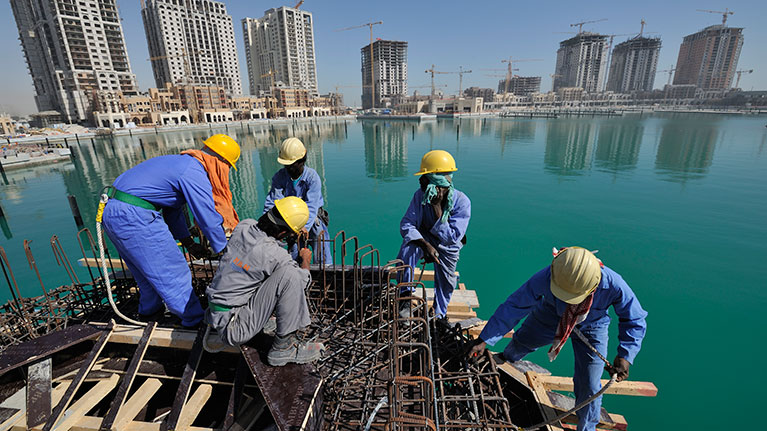Despite the clear progress, the organisation still stressed the need for the complete implementation of labour laws.
A total of 242,870 workers in Qatar were able to switch jobs between October 2020 and 2021 following the introduction of historic labour reform, the UN’s International Labour Organization (ILO) revealed on Monday.
According to the new ILO data, 8,653 people were able to move to new jobs in 2018. This spiked to 17,843 between September 2019 and August 2020, just months ahead of the dismantling of the Kafala system in October of that year.
The controversial system had stopped workers from freely changing jobs. However, despite its effective abolishment, the ILO said some workers still face challenges in navigating the process, or face retaliation from their employers, when changing their jobs.
Other figures released by the ILO further highlighted progress made by Qatar since it introduced labour reforms over the past years, following close work with the UN agency.
According to the ILO, more than 280,000 workers, mostly in the construction sector, witnessed an increase in their basic wage by March 2021. This came after the non-discriminatory minimum-wage law, the first in the region, came into force during the same reported period.
The minimum-wage law established a monthly minimum wage of QAR 1,000, including the basic living allowances for select workers. Employers who fail to comply with the law will face a one-year jail sentence and a QAR 10,000 fine.
In 2019, 75% of workers were reportedly covered by the Wage Protection System (WPS), a number that was bumped up to 96% in 2020.
“The WPS monitors the payment of workers in the private sector. It has reduced wage abuses and wage disputes,” said the ILO, noting that the non-payment of wages and benefits remain the most common complaints to Qatar’s Ministry of Labour (MOL).
Meanwhile, the total number of complaints submitted by workers increased since the MOL launched a platform in May 2021, enabling employees to raise violations committed by their employers.
In 2020, 11,703 complaints were filed whereas 24,650 were submitted in 2021 alone. Out of the total complaints submitted last year, 75% were settled, 24% were sent to labour courts, and 1% remain under review.
“The establishment of an online complaints platform made it easier to report labour rights violations,” said the ILO.
To ensure that the new policies are being properly implemented, the MOL has intensified its monitoring campaigns of companies. The ministry conducted 21,644 inspections in 2019, 33,546 in 2020, and 33,880 in 2021.
Despite the presence of laws imposed by the government, some employers have been accused of failing to abide by them.
Throughout the reported inspections, 9,976 infringements were detected in 2019 and 12,485 were found in 2020. Last year, the total violations found by the ministry were 10,129.
Companies have also appeared to not comply with Qatar’s summer work hours, aimed at protecting workers from the season’s scorching heat. To ensure the protection of workers, labour inspectors carried out a campaign in 2021, during which 338 companies were shut down for not abiding by the law.
The introduction of policies, however, have appeared to reduce the number of heat-related disorders.
Between June and September 2019, the ILO found 1,372 workers suffering from heat disorders whereas 1,520 were reported in the same period in 2020. The total number of heat-related injuries significantly dropped last year to 626.
Despite the clear progress, the ILO still stressed the need for the complete implementation of labour laws.
Since winning the bid to host the 2022 World Cup more than a decade ago, Qatar faced international scrutiny mainly by western countries over conditions for migrant workers and a lack of adequate laws to protect them in the Gulf state.
The criticism has led to sweeping reform that was a result of close work and cooperation with the ILO as well as other international bodies to improve the local work environments.
The ILO opened its first office in Qatar in 2018.
The Gulf state’s efforts have also been recognised amid the western criticism.
Last month, Qatar’s Minister of Labour Ali bin Saeed bin Smaikh Al Marri was elected as the Vice-President of the Labour Conference in Geneva.







